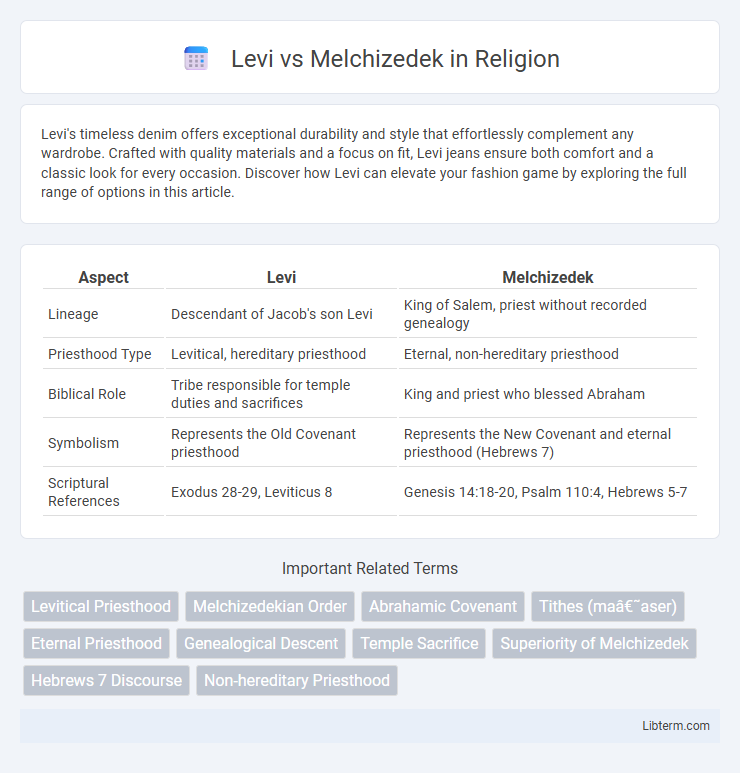Levi's timeless denim offers exceptional durability and style that effortlessly complement any wardrobe. Crafted with quality materials and a focus on fit, Levi jeans ensure both comfort and a classic look for every occasion. Discover how Levi can elevate your fashion game by exploring the full range of options in this article.
Table of Comparison
| Aspect | Levi | Melchizedek |
|---|---|---|
| Lineage | Descendant of Jacob's son Levi | King of Salem, priest without recorded genealogy |
| Priesthood Type | Levitical, hereditary priesthood | Eternal, non-hereditary priesthood |
| Biblical Role | Tribe responsible for temple duties and sacrifices | King and priest who blessed Abraham |
| Symbolism | Represents the Old Covenant priesthood | Represents the New Covenant and eternal priesthood (Hebrews 7) |
| Scriptural References | Exodus 28-29, Leviticus 8 | Genesis 14:18-20, Psalm 110:4, Hebrews 5-7 |
Introduction to Levi and Melchizedek
Levi, a descendant of Abraham through Jacob, represents the priestly tribe established in the Old Testament, tasked with religious duties and temple service. Melchizedek, the king of Salem and priest of the Most High God, is a mysterious figure who prefigures eternal priesthood by combining royal and priestly roles without ancestral lineage. Their comparison foreshadows the transition from the Levitical priesthood to a superior, eternal priesthood embodied by Melchizedek's order in biblical theology.
Historical Background of Levi
Levi, one of the twelve tribes of Israel, originated from Jacob's son Levi, who was designated as the priestly tribe in ancient Jewish tradition. The tribe of Levi held a unique status, responsible for religious duties and temple service, distinct from Melchizedek's mysterious priesthood predating Levitical order. Historically, Levi's priesthood was hereditary, centralized through Aaron's descendants, establishing a structured priestly lineage in contrast with Melchizedek's timeless, king-priest role mentioned in Genesis and later in Hebrews.
The Mysterious Figure of Melchizedek
Melchizedek, described in Genesis 14 as the king of Salem and priest of the Most High God, holds a unique and enigmatic position distinct from Levi's lineage. Unlike Levi, whose priestly duties are inherited through genealogy, Melchizedek's priesthood is portrayed as eternal and without record of beginning or end in Psalm 110 and Hebrews 7. This mysterious figure symbolizes a higher, divine priesthood that supersedes the Levitical order, emphasizing spiritual authority and intercession beyond traditional hereditary roles.
Biblical References: Levi and Melchizedek
Levi, the fourth son of Jacob, is often associated with the priestly tribe of Israel, as referenced in Hebrews 7:5, where the Levitical priesthood is compared to the order of Melchizedek. Melchizedek, king of Salem and priest of the Most High God, appears in Genesis 14:18-20, blessing Abram and symbolizing a priesthood that predates and supersedes the Levitical order. Psalms 110:4 prophesies a priestly role "after the order of Melchizedek," highlighting its eternal and superior nature compared to Levi's hereditary priesthood.
Genealogy: Lineage and Ancestry
Levi, the third son of Jacob, established the priestly tribe of Israel, with his descendants serving as traditional priests under the Mosaic Law. Melchizedek, king of Salem and priest of the Most High God, appears in Genesis without detailed genealogical records, symbolizing an eternal priesthood that predates the Levitical lineage. The contrast in lineage highlights Levi's documented ancestry in the Israelite tribal system versus Melchizedek's mysterious and timeless priesthood, which is later referenced in the book of Hebrews as a superior, eternal order.
Priesthood of Levi: Role and Significance
The Priesthood of Levi, established through Aaron and his descendants, played a central role in Israelite worship by performing temple sacrifices and maintaining the sacred rituals outlined in the Torah. This Levitical priesthood symbolized a covenantal responsibility to mediate between God and the people, emphasizing hereditary priestly duties centered on the Tabernacle and later the Temple in Jerusalem. Levitical priests were tasked with upholding purity laws, offering daily burnt offerings, and overseeing religious festivals, which underscored their integral function within the religious and social fabric of ancient Israel.
The Order of Melchizedek: Meaning and Impact
The Order of Melchizedek represents a unique priesthood that transcends the traditional Levitical line, symbolizing eternal and divine authority without genealogical limitation. Melchizedek, described in Genesis and Psalms as both king and priest, embodies a spiritual order marked by righteousness and peace, profoundly influencing Christian theology and the interpretation of Jesus' eternal priesthood in the New Testament, particularly in the Book of Hebrews. This order challenges the Levitical emphasis on lineage, emphasizing a higher, eternal priestly role connected to God's covenant and kingdom.
Contrasting the Priesthoods: Differences and Similarities
Levi's priesthood, rooted in the Mosaic Law, emphasizes hereditary succession and temple rituals, while Melchizedek's priesthood is characterized by a timeless, divine appointment linked to righteousness and peace. Both priesthoods serve as mediators between God and humanity but differ fundamentally in their origins and permanence, with Levi's being temporary and Melchizedek's eternal. The contrast highlights thematic elements of law versus grace, ritual versus spiritual authority, and temporal versus eternal priesthood in biblical theology.
Theological Implications in Christianity and Judaism
Theological implications of Levi versus Melchizedek center on priesthood legitimacy and covenant continuity in Christianity and Judaism. In Judaism, Levi represents the hereditary priesthood established through Abraham's lineage, maintaining the Mosaic covenant and temple rituals. Christianity interprets Melchizedek as a divine priesthood surpassing the Levitical order, embodying an eternal and universal covenant through Christ's unique, heavenly intercession.
Levi vs Melchizedek: Lasting Legacy and Relevance
Levi and Melchizedek represent two distinct priestly lineages in biblical tradition, where Levi's legacy is tied to the hereditary Levitical priesthood and Melchizedek's to a timeless, unique priesthood that prefigures Christ's eternal priesthood in Hebrews 7. The lasting relevance of Melchizedek lies in his portrayal as a priest-king of righteousness and peace, transcending traditional tribal boundaries and symbolizing a superior, everlasting priesthood. Levi's significance endures through the Mosaic covenant and the Levitical laws, while Melchizedek's enduring legacy shapes theological understandings of divine authority and eternal mediation.
Levi Infographic

 libterm.com
libterm.com